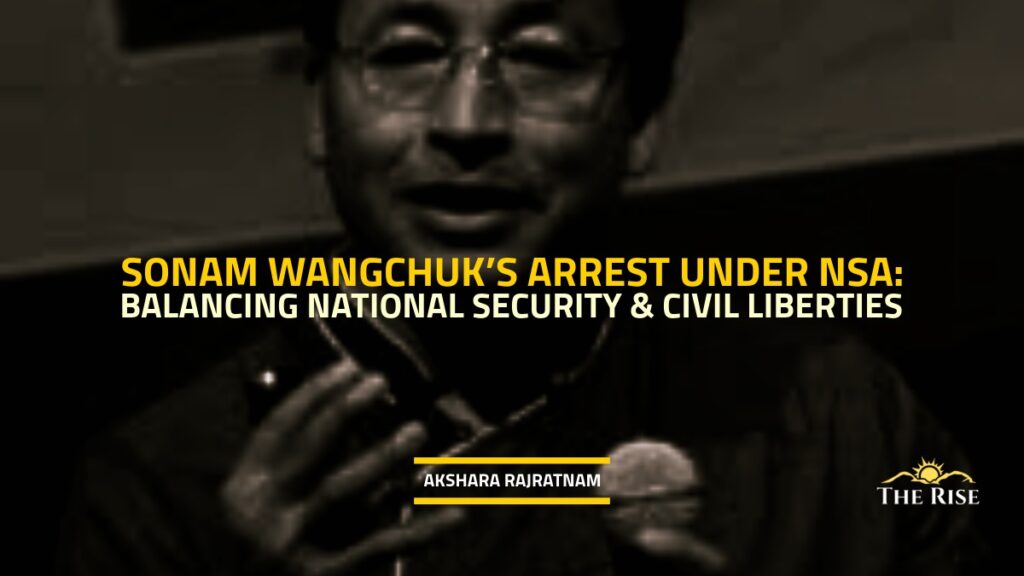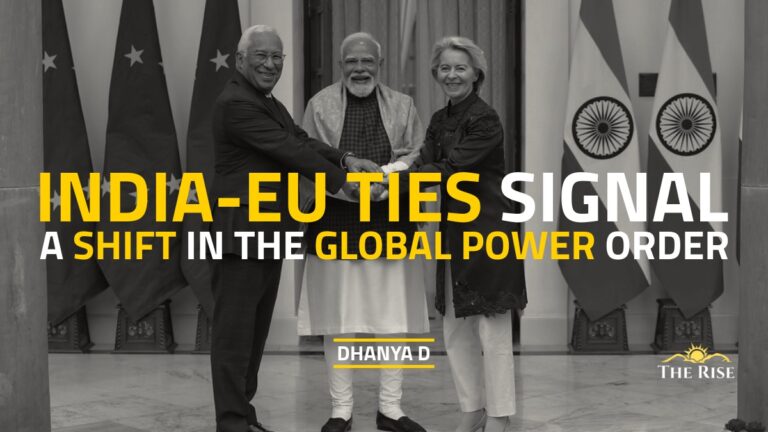The Wangchuk case necessitates a revisit to preventive detention in contemporary India. While instances of genuine national threats may occasionally trigger the usage of extraordinary measures, the routine invocation of special laws like the NSA, even in situations manageable under ordinary criminal laws, erodes civil liberties without corresponding security gains.
The recent arrest of the climate activist Sonam Wangchuk under the National Security Act (NSA), 1980, following the protests in Ladakh, has again rekindled a fundamental debate about the delicate balance between state security and individual liberty. As Wangchuk was sent to Jodhpur jail, nearly a thousand kilometres from Leh, an uncomfortable question is once again raised about the use of preventive detention laws in a constitutional democracy.
The Legal Architecture of Preventive Detention
A legislative genealogy is traceable from the Maintenance of Internal Security Act (MISA) to the original Preventive Detention Act of 1950. The National Security Act (NSA) of 1980 represents the post-emergency avatar of India’s longstanding engagement with preventive detention. What separates NSA from other laws is its sweeping preventive character, where detention is authorised for the act anticipated and not the act committed. Sections 3(1) and 3(2) allow the central or the state government to detain any person to prevent actions which are “prejudicial to the security of India” or the “maintenance of public order”. This kind of pre-emptive approach fundamentally undermines the presumption of innocence that anchors criminal jurisprudence. While laws such as the Bharatiya Nagarik Suraksha Sanhita, 2023, require the presence of specific evidence of an offense before arrest, the NSA permits detention based on a comparatively lower threshold, i.e, “subjective satisfaction” of the detaining authority.
Also Read: Supreme Court’s Dupare Ruling: A Turning Point for Death Penalty Safeguards in India
Article 22 of the Constitution of India provides safeguards. Clauses (4) through (7) mandate that no person shall be detained beyond three months without the approval of the advisory board, and that detainees must be informed of the grounds for detention and must be given the opportunity for representation. However, the efficacy of these safeguards has been questioned repeatedly.
Constitutional Tensions and Judicial Scrutiny
The Supreme Court of India has navigated through the precarious path of NSA jurisprudence. In A.K. Roy v. Union of India (1982), while upholding the constitutional validity of the NSA Act, the court did acknowledge the “drastic and extraordinary power” conferred by preventive detention. The judgment emphasized that the power should be exercised with ”extreme caution” and “utmost care”.
More significantly, the court in the case of Kartar Singh v. State of Punjab (1994) established that judicial review of orders under the NSA, though limited, cannot be fully excluded. The judiciary can examine the grounds of detention, the consideration of relevant materials, and the existence of a proximate nexus between the grounds of detention and the actual detention.
Also Read: Supreme Court’s Landmark Godavarman Verdict 2025: Balancing Forest Protection with Human Settlements
This ground of “proximate nexus” becomes crucial in the recent Wangchuk’s Case. While the protests did turn violent and resulted in casualties, the question lies in whether the alleged “incitement” bears sufficient connections to national security concerns to justify invoking national security provisions The distinction between ordinary law and order situations handled under general laws like BNSS and BNS versus the threat to national security requiring the invocation of special laws like NSA is not merely semantic; it flows through the veins of proportionality in constitutional governance.
The Public Order versus National Security Distinction
The distinction between “public order” and “national security” is a critical but often overlooked aspect of the NSA jurisprudence. This distinction was made clear by the Supreme Court in the case of Ram Manohar Lohia vs State of Bihar, 1966, wherein the court held that acts affecting individuals constitute law and order issues, acts affecting public tranquility constitute public order concerns, and the acts threatening the security or integrity of the nation constitute national security matters. The invocation of national security provisions in a situation of law and order might result in a conflict with the carefully distinguished categories of constitutional jurisprudence.
The Problem with Prolonged Detention Without Trial
Section 3(3) of the NSA allows detention up to twelve months before formal charges are framed. This provision results in the creation of a parallel legal universe where the individuals are deprived of their liberty and protections mandated by the criminal procedure, like the right to counsel, the right to cross-examine witnesses, the presumption of innocence, or the proof beyond a reasonable doubt. The supposed safeguard of the advisory board mechanism operates behind closed doors, with detainees having no representation during the board proceedings. An attempt was made to address this lacuna by the Supreme Court in the case of Huidrom Konungjao Singh v. State of Manipur (2012), where the court directed that legal representation be allowed ordinarily. However, the implementation remains inconsistent.
Also Read: Supreme Court Judgment on Election Petitions and Compliance Explained
Moreover, the subjective satisfaction clause invites abuse. The provision that the detaining authority needs only to be “satisfied” that the preventive detention is necessary raises serious doubts. Time and again, Courts have held that this satisfaction should be based on objective material and not mere subjective opinions, yet the threshold is comparatively lower than the existing evidentiary standards in criminal trials.
The Geography of Detention: Jodhpur and Justice
The transfer of Wangchuk to Jodhpur jail, which is nearly 1,000 kilometers from Leh, raises additional concerns about access to justice. While not explicitly prohibited, such detention at distant places severely affects the detainee’s ability to challenge detention through a habeas corpus petition. Moreover, family visits become arduous, legal consultation gets complicated, and the effective exhaustion of constitutional remedies becomes practically difficult. This practice has colonial roots, where political prisoners were transferred to distant locations to break their connections with local structures of support. In a constitutional democracy, such geographical isolation requires compelling justification.
The Way Forward: Balancing Security and Liberty
The Wangchuk case necessitates a revisit to preventive detention in contemporary India. While instances of genuine national threats may occasionally trigger the usage of extraordinary measures, the routine invocation of special laws like the NSA, even in situations manageable under ordinary criminal laws, erodes civil liberties without corresponding security gains.
Several reforms should be considered: First, making the definition of “national security” stricter so that it doesn’t get confused with regular law and order. Second, it is necessary to have a legal presentation before Advisory Boards. Third, a time-bound judicial review at set intervals. Fourth, limits on distant detention that make it harder to access justice. Fifth, clear rules about how to report on how the NSA is used. Democratic maturity does not entail the relinquishment of security concerns, but rather the assurance that security measures remain accountable to constitutional principles. While Wangchuk is in jail, we need to ask ourselves if we are stopping real threats or just silencing people who disagree with us. The answer will determine whether India’s system of preventive detention upholds or undermines the Constitution.
Disclaimer: The views expressed in this article are those of the author solely. TheRise.co.in neither endorses nor is responsible for them. Reproducing this content without permission is prohibited.
About the author
Akshara Rajratnam is a practicing lawyer in Lucknow High Court, a writer, and an International Relations enthusiast.






